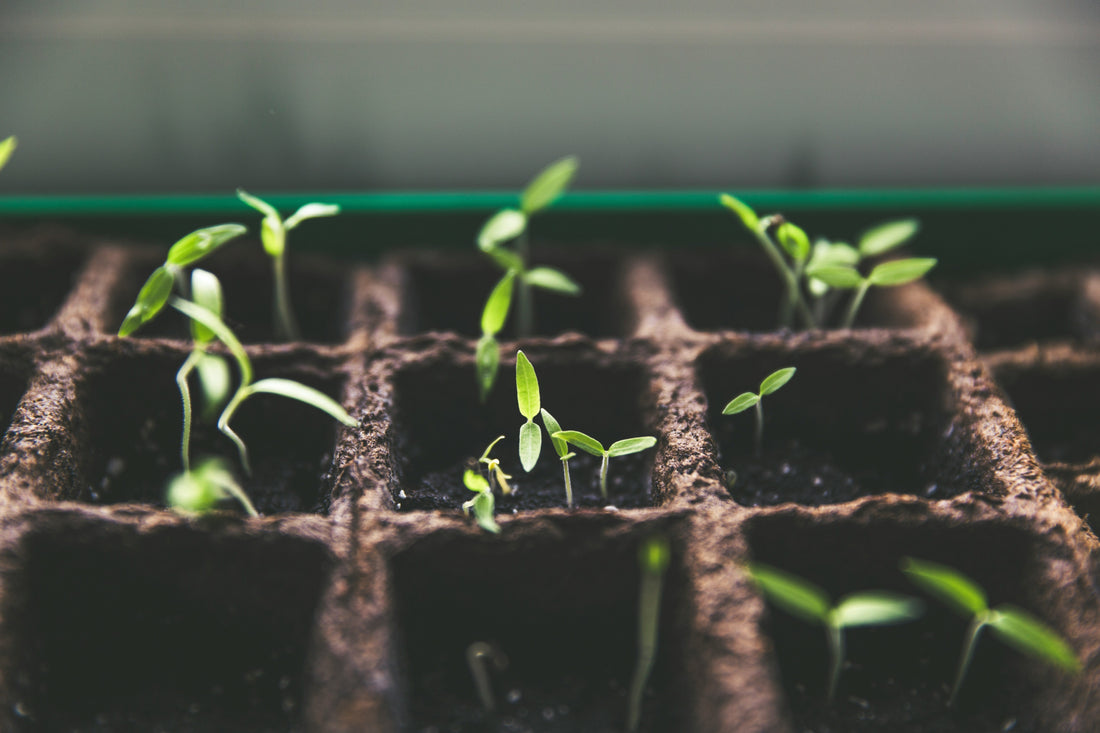
So You Want to Learn How to Compost?
Hanna LeachWe’re so glad you want to learn to compost! Anything to reduce the amount of food waste produced annually in the U.S. is wonderful, especially since 40% of the food produced in our country goes straight to the landfill. This is particularly relevant to York, Pennsylvania (where our shop is located!), as our landfill is currently full or at least near to reaching capacity, and our trash will soon be sent to other cities or our landfill expanded.
Because of this, it's so important to do anything we can to divert more waste from heading to the landfill where it will never decompose properly. Composting allows the cycle of life to continue. And on that note, let’s start the discussion on how to begin your compost!
How does a compost work?
In very simple terms, a compost pile helps organic material decompose into rich, nutritious soil. With the proper ratio of materials microorganisms will thrive, breaking them down and warming up the compost bin in the process. In a sense, the compost pile is alive.
What will you need?
First things first, make sure you have the space for a compost bin outside. It is possible to simply have a compost pile, however if you don’t have a large piece of land this might not be a good option. I suggest purchasing a compost bin online (here’s one to look at), and setting it up in a shady area of your yard. This will keep your compost pleasantly warm in the summer months while preventing it from becoming too warm, which helps the microorganisms in the compost to break down the material efficiently.
You will also need a pitchfork or something to “stir” the compost with, unless you purchase a tumbler, in which case you can just turn the compost with a lever (though this option tends to be inactive in the winter as it's too cold for the microorganisms).
Make sure to have a small bin indoors to collect the kitchen scraps you will add to your compost. Refillism has a nice option made from bamboo fibre that can sit on your countertop. It has charcoal filters to prevent unpleasant smells that might linger before the compost is emptied, and it is dishwasher safe!
What can go in your compost?
You might be surprised to learn that not all organic matter can be composted. Generally speaking, these are the things you can and cannot add to your compost:
|
Can Be Composted (Green) |
Can Be Composted (Brown) |
Cannot Be Composted |
|
Fruit & Veggie Scraps |
Shredded Paper |
All Meats |
|
Eggshells |
Shredded Cardboard |
Glossy Paper |
|
Hair |
Sawdust |
Pet Droppings |
|
Leaves, Grass Clippings, & Weeds |
Dried Leaves |
Dairy Products |
|
Coffee Grounds & Tea |
Plant Stalks |
“Compostable” products |
*A note on "compostable" and "biodegradable" products not being compostable: Unfortunately, most companies write this as a form of greenwashing. Putting the label "biodegradable" on products is misleading as the term is not officially regulated and does not require the item to be made of organic material. Similarly, stating an item is "compostable" on packaging typically means it can be composted only in a commercial facility. An item will only be compostable in a home compost if it explicitly states so.
How do you care for your compost?
Make sure to keep the compost bin in a shady area of your yard. This allows it to be warm, but not too warm that it overheats. If it seems not to be retaining moisture well, you can always cover it with a tarp.
To start your compost, add a base layer of brown materials, about four inches deep. After that, you should continue alternating layers of green and brown scraps, with the brown layer twice the size of the green layer. Always cover up any greens you add with a brown layer! As you add to your compost, make sure to break down whatever you are composting into small pieces.
Whenever you add scraps, determine if you need to water down the bin by checking the compost’s consistency. According to the United States Environmental Protection Agency, your compost should look and feel like a “wrung-out wet sponge” to maintain the proper decomposition rate. Too much or too little water can cause the compost to stop heating up.
Every two weeks you must aerate the compost bin by stirring it with the pitchfork or other tool. This allows the decomposition of the scraps to be consistent throughout the bin. After a few months pass, you should have rich, healthy soil to spread.
If you meet any troubles, try checking out the sources below that help troubleshoot questions from beginning composters, or leave your questions in the comments! Happy composting!
References:
Food Loss and Waste. U.S. Food and Drug Administration. https://www.fda.gov/food/consumers/food-loss-and-waste
M, Walters. York County's Modern Landfill could face fines over 419 Clean Water Act violations: judge. York Dispatch. https://eu.yorkdispatch.com/story/news/local/2025/04/04/york-countys-modern-landfill-could-face-fines-over-419-clean-water-act-violations-judge/82798637007/
H, Leach. York's Landfill Is Full. Refillism. https://refillism.com/blogs/blog/yorks-landfill-is-full?_pos=1&_sid=28a3ec91d&_ss=r
M, Walters. Modern Landfill's future in York County tied to 1995 closure plan. York Dispatch. https://eu.yorkdispatch.com/story/news/local/2024/08/15/modern-landfills-future-in-york-county-tied-to-1995-closure-plan/74788588007/
Landfills. National Geographic. https://education.nationalgeographic.org/resource/landfills/
How to compost effectively: step-by-step guide. Queensland Government: Department of Environment, Tourism, Science and Innovation. https://www.detsi.qld.gov.au/our-department/news-media/down-to-earth/how-to-compost-effectively
A beginner's guide to composting. Good Living. https://www.environment.sa.gov.au/goodliving/posts/2019/05/guide-to-composting
Composting. Royal Horticulture Society. https://www.rhs.org.uk/soil-composts-mulches/composting
H, Gazeley. The Pros and Cons of Compost Tumblers. Growing Interactive. https://www.growveg.co.uk/guides/the-pros-and-cons-of-compost-tumblers/
H, Leach. What Is Greenwashing? Refillism. https://refillism.com/blogs/blog/what-is-greenwashing?_pos=1&_sid=399d17b7e&_ss=r
Compostable versus biodegradable packaging. Compost Connect. https://www.compostconnect.org/uk/biodegradable-vs-compostable/
Commercial composting vs home composting: what is the difference? BioPak. https://www.biopak.com/uk/resources/commercial-composting-vs-home-composting?srsltid=AfmBOorAOFB5rSS8Z77Tn1JQgUKkjbHTAEqjaN5PTwsZRF9YFgbX6Ysu
Composting At Home. United States Environmental Protection Agency. https://www.epa.gov/recycle/composting-home#options
How To Start Composting At Home. BBC Gardener's World Magazine. https://www.gardenersworld.com/how-to/maintain-the-garden/how-to-compost/
Visit York, PA’s Original Refillery and Eco-Friendly Store – Serving York County Since 2022
